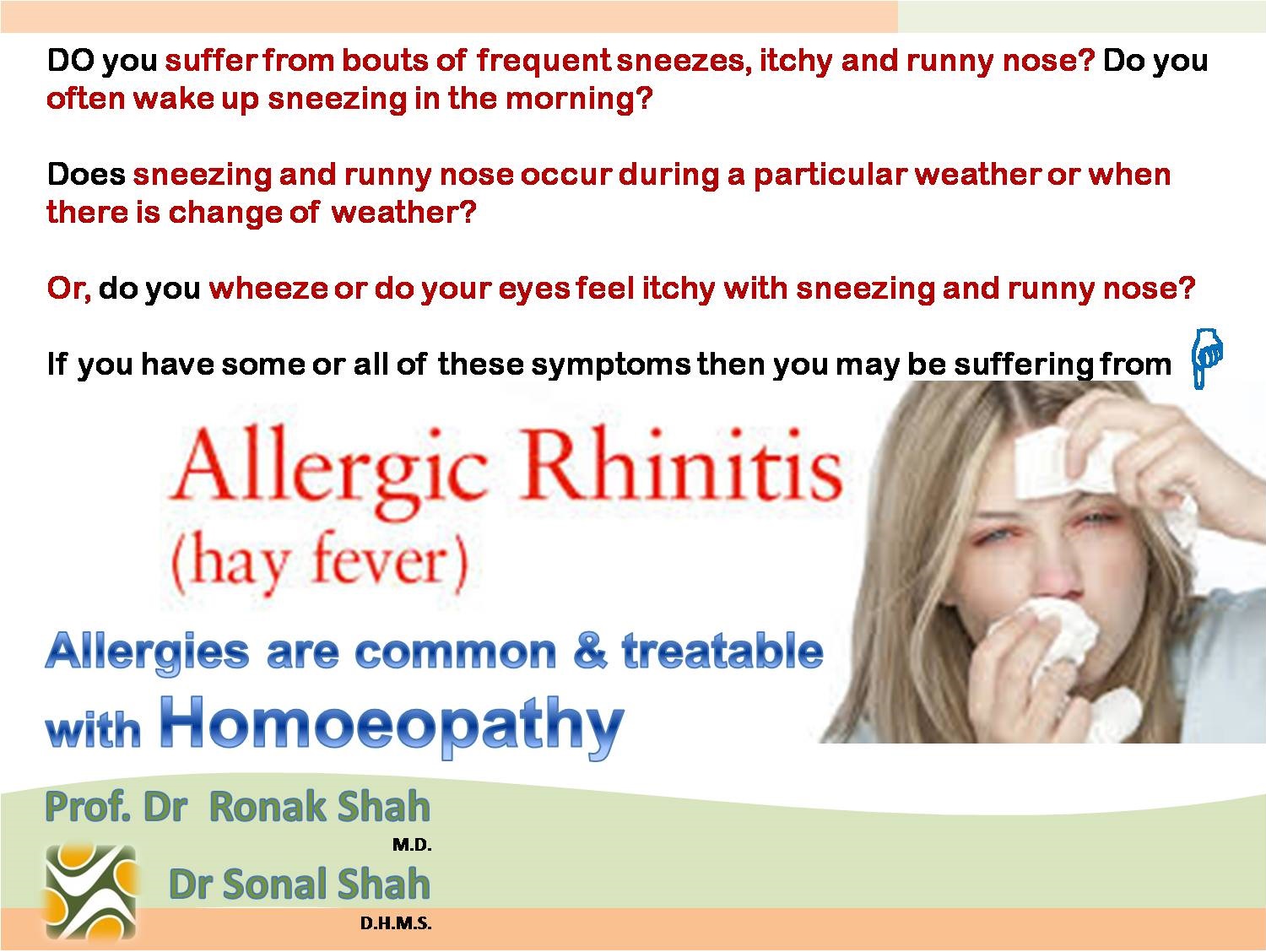
ALLERGIC RHINITIS (HAY FEVER)
Allergic Rhinitis (Hay Fever) treated with Homoeopathy
Acute attacks of hay fever often respond to homeopathic remedies. Allergies are usually deepseated
problems, and are often best addressed with a constitutional remedy.
What Is Allergic Rhinitis?
Rhinitis refers to inflammation of the nasal passages. This inflammation can cause a variety of
annoying symptoms, including sneezing, itching, nasal congestion, runny nose, and postnasal
drip (the sensation that mucus is draining from the sinuses down the back of the throat).
Brief episodes of rhinitis are usually caused by respiratory tract infections with viruses (eg, the
common cold). Chronic rhinitis is usually caused by allergies, but it can also occur from overuse
of certain drugs, some medical conditions, and other unidentifiable factors.
CAUSES
Allergic rhinitis is caused by a nasal reaction to small airborne particles called allergens
(substances that provoke an allergic reaction). In some people, these particles also cause
reactions in the lungs (asthma) and eyes (allergic conjunctivitis).
Seasonal versus perennial allergic rhinitis — Allergic rhinitis can be seasonal (occurring
during specific seasons) or perennial (occurring year round).
- The allergens that most commonly cause seasonal allergic rhinitis include pollens from
trees, grasses, and weeds, as well as spores from fungi and molds.
- The allergens that most commonly cause perennial allergic rhinitis are dust mites,
cockroaches, animal dander, and fungi or molds. Perennial allergic rhinitis tends to be
more difficult to treat.
SYMPTOMS
The symptoms of allergic rhinitis vary from person to person. Although the term "rhinitis" refers
only to the nasal symptoms, many patients also experience problems with their eyes, throat, and
ears. In addition, sleep can be disrupted, so it is helpful to consider the entire spectrum of
symptoms.
- Nose – Watery nasal discharge, blocked nasal passages, sneezing, nasal itching, postnasal
drip, loss of taste, facial pressure or pain.
- Eyes – Itchy, red eyes, feeling of grittiness in the eyes, swelling and blueness of the skin
below the eyes (called allergic shiners).
- Throat and ears – Sore throat, hoarse voice, congestion or popping of the ears, itching
of the throat or ears.
- Sleep – Mouth breathing, frequent awakening, daytime fatigue, difficulty performing
work.
When an allergen is present year round, the predominant symptoms include postnasal drip,
persistent nasal congestion, and poor-quality sleep.
CERTAIN TIPS
To reduce allergy symptoms, eat a moderately low-fat, high-complex-carbohydrate diet. Drink
1/2 of body weight in ounces of water daily (e.g., a 150 lb person would drink 75 oz of water).
Include a lot of the following foods in the diet:
- Dark green, leafy vegetables
- Deep yellow and orange vegetables
- Nettles, bamboo shoots, cabbage, beet tops, beets, carrots, yams
- Onions, garlic, ginger, cayenne, horseradish
Eliminate the following from the diet:
- Alcohol, caffeine, and dairy products
- Bananas and citrus fruit
- Chocolate
- Food colorings (tartrazine)
- Peanuts
- Red meat
- Sugar
- Wheat
HOMOEOPATHIC TREATMENT:
-
Allium cepa: Indications for this remedy include watery eyes and a clear nasal discharge
that irritates the upper lip, along with sneezing and a tickling cough. The person usually
is thirsty, and feels worse indoors and when rooms are warm, and better in fresh air.
- Arsenicum album: A burning, watery, runny nose with a stuffy, tickling feeling during
allergy attacks suggests a need for this remedy. Swelling below the eyes and a wheezy
cough are common. The person may feel chilly, restless, anxious, and is often very tired.
- Euphrasia: This remedy can be helpful if the eyes are swollen and irritated with acrid
tears or pus. The nose also runs, but with a blander discharge. Symptoms are often worse
in the daytime and worse from warmth, and the eyes may hurt from too much light. The
person can also have a cough in the daytime, which improves at night.
- Ferrum phosphoricum: This is a very useful remedy in the early stages of any
inflammation. Taken when allergy symptoms start, it often slows or stops an episode.
Symptoms include runny eyes with a burning or gritty feeling, facial flushing, watery
nose, and short, hard, tickling cough.
- Gelsemium: A tired, droopy feeling during allergies with a flushed and heavy-feeling
face suggest a need for this remedy. A sensation of dryness or of swollen membranes
may be felt inside the nose—or the nose may run with irritating watery discharge, with
the person sneezing frequently. Aching in the back of the head and neck, a trembling
feeling, and chills along the spine are often seen when a person needs Gelsemium.
- Natrum muriaticum: Allergy attacks with sneezing, watery eyes, clear nasal discharge
that resembles egg white, and a loss of taste and smell will all suggest a need for this
remedy. The person may have dark circles under the eyes, be thirsty, feel withdrawn and
sad, and act irritable if comforted.
- Nux vomica: If the nose is alternately stuffed up (especially outdoors or at night) and
running (indoors and in the daytime), this remedy may bring relief. Other symptoms
include a teasing cough, a scraped or tickly feeling in the throat, and headache. A person
who needs this remedy often feels impatient, irritable, and chilly.
- Sabadilla: Long paroxysms of sneezing, itching in the nose with irritating runny
discharge, a feeling of a lump in the throat, and watery eyes will all suggest a need for
this remedy. The person may feel nervous during allergy attacks, and trying to
concentrate can bring on drowsiness or headache.
- Wyethia: Intolerable itching felt on the roof of the mouth and behind the nose—
sometimes extending into the throat and ears—strongly suggests the use of this remedy.
Everything in the person’s head feels dry and irritated, but the nose may still be runny.